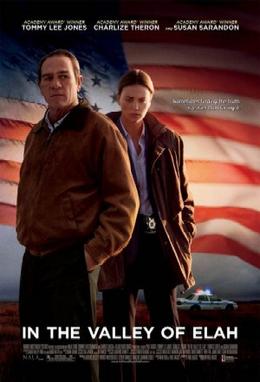Maybe 15 or 20 years down the road, there will be a wave of movies in theaters about the wars in Iraq and Afghanistan, much the way movies about WWII and even Korea and Vietnam were released. I doubt it, but who knows. For now, the wounds may be too fresh so we get movies kinda about the war, related but not directly about the fighting, like 2007's In the Valley of Elah.
A former army veteran and military policeman, Hank Deerfield (Tommy Lee Jones) lives in Tennessee with his wife, Joan (Susan Sarandon). He is more than surprised one day to get a call that his son, Mike, recently back from a tour in Iraq, has gone missing and is days away from being reported as going AWOL. Curious what's going on and sensing something suspicious, Hank drives to the army base in New Mexico to look into it himself, investigating what's happened to his son, if anything. He gets various responses, some more helpful than others. Hank is stonewalled by some, greeted by others, and gets some less than willing help from a local detective, Emily Sanders (Charlize Theron), who joins him in the investigation. It doesn't take long before clues mount up, but it might all be for naught. Mike's body has been found, dismembered and burned. What was Hank's son into?
Over the last ten-plus years, there hasn't been too many things more divisive than the fighting in Iraq and Afghanistan. Some support it wholeheartedly, others question why American forces are there at all. This film from director Paul Haggis goes down a different part -- mostly -- by having the fighting serve as a jumping off point for a police procedural. What happened in Iraq affects the police investigation. We follow Hank and Emily as they investigate Mike's disappearance, eventual murder and what led to it. The movie is at its strongest in those moments, a low-key but tense mystery that keeps us guessing. Hank, Emily, local police and army investigators all search and pursue each and every clue, anything that might lead to answers. Most lead to nothing, just dead ends, but all it takes is one clue to bring it all together.
What the movie is more focused on -- via the investigation -- is how the fighting in Iraq and Afghanistan has impacted the lives of the soldiers involved. A nasty little sub-genre of war movies dating back to The Best Years of Our Lives through Born on the Fourth of July and many more all deal with Post-traumatic stress disorder following their deployments. Through some videos and photos recovered from Mike's phone, Hank sees what his son and his fellow soldiers went through on a daily basis. Much like Vietnam was a new war, the Iraq war was unlike other conflicts. It becomes almost impossible to identify who your enemy is. Anyone and everyone could be trying to kill you. Thankfully the script and story from Haggis and Mark Boal doesn't hit us over the head with its message (for the most part). What the soldiers see, do and experience affects them in horrendous ways, ways that they can't just shake off because they're not overseas anymore.
Taking two familiar-ish characters and making them more than a cliched, cardboard cutout are Tommy Lee Jones and Charlize Theron. Who better to play a world-weary, semi-retired MP and army vet than TLJ? He's quiet and understated, knowing the answers he's looking for will almost certainly bring nothing positive. Just the same, he goes about his investigation so he knows what really happened to his son, and maybe more importantly, what drove him down that path. Theron's part is more familiar, a female detective who gets no respect from her colleagues, also a single mother with a son at home. She takes on this case for a couple reasons, to show she can, a little out of spite, and sometimes even against her better judgement. It's two really good performances, both with chances to show off dramatically, but neither actor overdoes it. Like their characters, they just go about their business.
Supporting Jones and Theron is an equally impressive supporting cast. Sarandon nails a smallish part as Jones' wife, waiting at home for a phone call she doesn't want to hear. Jason Patric is a scene-stealer as Sgt. Kirklander, an officer with Army intelligence trying to do his job as best he can while also seemingly trying to cover the Army's butt just in case. James Franco plays an Army officer who meets Hank early on while Josh Brolin plays the Chief of police, two small parts that didn't seem to justify the star power associated with them. Cool to see, just odd. Barry Corbin and Frances Fisher have quick appearances as people Hank meets/contacts during his questioning. Playing some of Mike's buddies from his squad are Wes Chatham, Jake McLaughlin, Mehcad Brooks and Roman Arabia with Jonathan Tucker playing Mike via flashback.
It's funny how one scene can change your feelings about a movie, and how quickly it can happen. Obviously, this is an anti-war movie, but I thought for the most part, Haggis did a good job getting his message across without screaming "THIS WAR IS BAD!" at us as viewers. Then there's the final shot of the movie which came across as heavy-handed and awkward. It's too bad because the build-up got that message across. The war is bad, and the effect it is having on our soldiers is horrific. I thought he got that message across building up to the finale. Too bad because the final reveal about Mike is a whopper, shocking and uncomfortable to hear. Still a really good film, but the ending left me with a sour taste because of one single shot. Go figure.
In the Valley of Elah (2007): ***/****


No comments:
Post a Comment